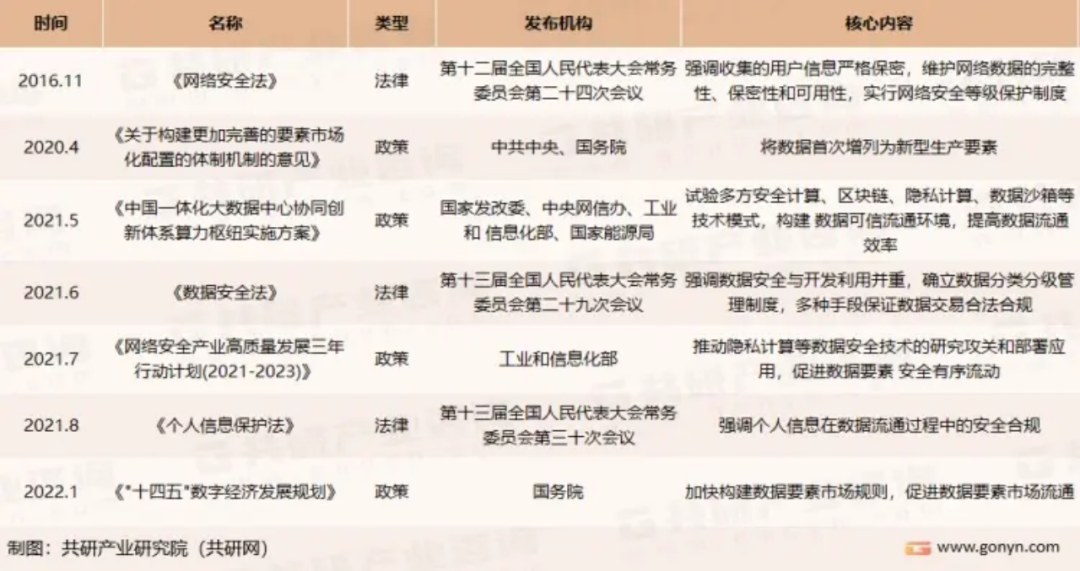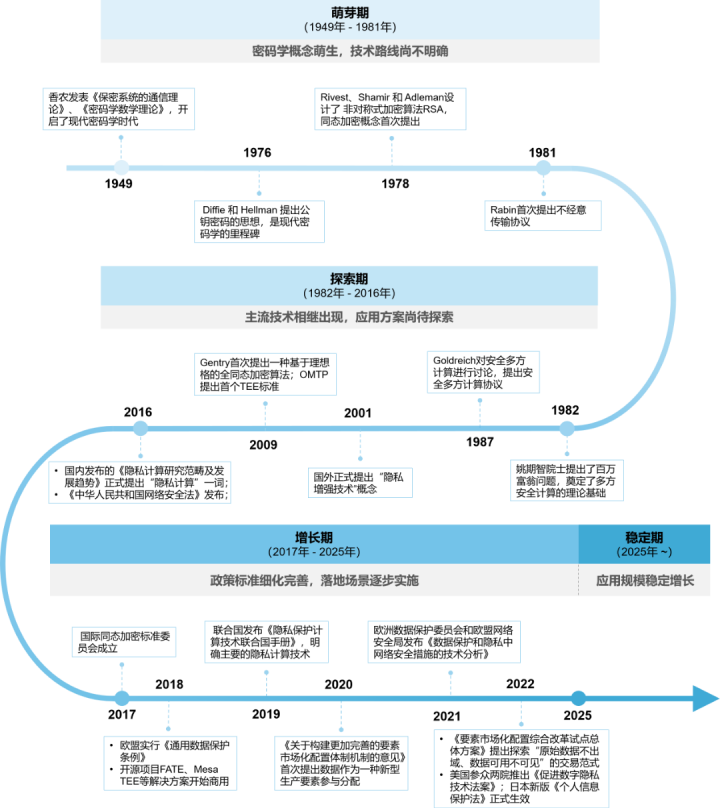(1) Privacy computing is rapidly developing under policy and demand drivers.
当下,数据已成为新型生产要素,数字经济正在成为驱动我国经济可持续高质量增长的新引擎。而数据与其他生产要素的本质区别在于:数据隐私是数据流动过程中产生价值的根本出发点。因此,数据的安全流通是数字经济发展的关键问题。针对数据安全等问题,国家陆续出台了多项法律法规和政策,其中以《网络安全法》《数据安全法》《个人信息保护法》三法为主,共同推动了隐私计算行业的快速发展。
Currently, data has become a new factor of production, and the digital economy is becoming a new engine for sustainable and high-quality economic growth in our country/China. However,the fundamental difference between data and other factors of production is: Data protection is the fundamental basis for creating value in the data flow process. Therefore, the secure circulation of data is a key issue for the development of the digital economy. In response to those issues such as data security, China has successively promulgated a number of laws, regulations, and policies, with the main ones being the <<Cybersecurity Law>>, <<Data Security Law>>, and <<Personal Information Protection Law>>. Taking together, they have promoted the rapid development of the privacy computing industry.
Laws and policies related to the privacy computing industry in recent years

资料来源:共研产业咨询(共研网)
Resource: Industry Research Consultancy (Gongyan.com)
隐私计算是一类技术的统称,是一套包含了密码学、数据科学、人工智能、安全硬件等多个交叉学科的技术体系,旨在为数据的计算过程和计算结果提供隐私安全保护。隐私计算技术作为保障数据安全流通的有效方式,乘时乘势高速发展,已逐渐成为促进数据要素跨域流通和应用的核心技术,广泛应用于金融、政务、医疗、能源、制造等诸多领域。
Privacy computing is a collective term for a class of technologies that comprise a technical system involving cryptography, data science, artificial intelligence, secure hardware, and other interdisciplinary fields. Its purpose is to provide privacy and security protection for the computation process and results of data. As an effective means to ensure the secure circulation of data, privacy computing technology has rapidly developed by following the trend. It has gradually become a core technology for promoting the cross-domain circulation and application of data elements, and it is widely used in various fields such as finance, government affairs, healthcare, energy, manufacturing, and more.
针对利用隐私计算促进数据流动、推动行业发展,相关部门发布了有关指导意见、实施方案和建设指南。
In response to the use of privacy computing to facilitate data flow and drive industry development, relevant departments have issued guidance, implementation plans and construction guidelines.
Laws and policies related to privacy computing driving big data development in recent years

![]()
对隐私计算产业来说,在政策利好的持续推动下,行业市场发展与技术不断更新,技术体系不断完善,行业标准日趋统一,应用场景逐渐丰富,意味着隐私计算产业将持续面临着良好的发展环境。
For the privacy computing industry, it continued promoted with the favourable policies. With the development of the industry market and continuous technical updates, the continuous improvement of the technical system, the increasing unification of industry standards and the gradual enrichment of application scenarios mean that the privacy computing industry will continue to face a favourable development environment.The evolution of the industry market and continuous technical updates, the continuous improvement of the technical system, the increasing unification of industry standards and the gradual enrichment of application scenarios mean that the privacy computing industry will continue to face a favorable development environment.
(二) 隐私计算正处于产业增长期阶段
(ii) Privacy computing industry is at the stage of industrial growth
隐私计算技术可以追溯到1949年由香农开启的现代密码学时代,之后其内涵、特征及代表技术不断演进,融合了密码学、人工智能、计算机科学以及安全硬件等众多领域技术。直到2001年,国外正式提出“隐私增强技术”(Privacy Enhancing Technologies,PETs)的概念。国内也于2016年的《隐私计算研究范畴及发展趋势》中正式提出“隐私计算”一词。
Privacy computing technology can be traced back to the modern cryptography era initiated by Shannon in 1949. Since then, its content, features, and representative technologies have continuously evolved, incorporating various fields such as cryptography, artificial intelligence, computer science, and secure hardware. In 2001, the concept of "Privacy Enhancing Technologies" (PETs) was officially proposed overseas. In 2016, the term "privacy computing" was formally introduced in China's "Research Scope and Development Trends of Privacy Computing."
根据隐私计算技术出现、发展、落地到广泛应用的不同特点,我们将隐私计算的发展历程划分为四个阶段(如下图):
Based on the different characteristics of the emergence, development, and widespread application of privacy computing technology, we divide the development process into four stages (as shown in the figure below):
Four development stages of Privacy Computing

资料来源:中国信通院-隐私计算联盟
Source: China Academy of Information and Communications Technology - Privacy Computing Alliance
萌芽期(1949年-1981年):需求出现,概念萌芽。起始于20世纪40年代,现代信息学之父克劳德·香农的一篇重要论文《保密系统的通信理论》,被认为是现代密码学时代的开端。
Emerging Stage (1949-1981): Demand arises, concept begins to emerge. It started in the 1940s with an influential paper by Claude Shannon, known as the father of modern information theory, titled "Communication Theory of Secrecy Systems." This paper is considered the beginning of the modern cryptography era.
探索期(1982年-2016年):主流技术路线出现。随着多方安全计算、联邦学习、可信执行环境等隐私计算技术的出现和发展,隐私计算的技术栈日趋成熟。
Exploration Stage (1982-2016): Mainstream technical routes emerge. With the emergence and development of privacy computing technologies such as secure multi-party computation, federated learning, and trusted execution environments, the technical stack of privacy computing has become increasingly mature.
增长期(2017年-2025年):多行业的需求方和厂商陆续加入,专利、论文、标准、政策、实施案例相继涌现。该时期各国政府逐渐加强对数据安全和个人隐私保护的重视,各项政策法规陆续制定,基于隐私计算技术的数据流通产品得到不断探索应用和落地实施。
Growth Stage (2017-2025): Demand from various industries and manufacturers gradually increases, leading to the emergence of patents, research papers, standards, policies, and implementation cases. During this period, governments worldwide gradually strengthen their focus on data security and personal privacy protection. Consequently, various policies and regulations are enacted, and products facilitating data circulation based on privacy computing technology are continuously explored and implemented.
稳定期(2025年~):未来,随着政策和法律的清晰明确,技术进一步成熟,隐私计算作为“数据流通基础设施”将被大众广泛接受。随着“隐私计算+”发展,行业应用稳步推进,更多大型企业开始全面使用隐私计算技术,应用规模稳定增长。
Stable Stage (2025 and beyond): In the future, with clear policies and laws, further technological maturity, and widespread acceptance by the general public, privacy computing will be widely adopted as a "data circulation infrastructure." As "privacy computing+" develops, industry applications will steadily progress, and more large enterprises will fully utilize privacy computing technology, resulting in a stable growth in application scale.
当前,隐私计算仍处于产业快速增长期,即将迈入前景广阔的稳定期。随着国家数据要素市场的加速建设,隐私计算技术将在更多场景得到广泛应用,“原始数据不出域,数据可用不可见”将成为多数行业数据流通的交易范式。除了实现“数据可用不可见”外,未来还需要进一步对数据的用途和用量进行控制和审计,真正实现数据使用的“可控可计量”,最大限度的保障数据要素流动过程中数据提供方的合法权益。此外,在工业界,随着国内外政策法规的不断完善,再加上对于某些数据高敏感行业强监管的需求,数据规模不断扩大,直接在中心服务器上计算或学习的压力会不断增加,从中心化向分布式或去中心化过渡的演化也将成为未来趋势。根据《Gartner 2022隐私技术成熟度曲线》研究报告表明:预计在未来5~10年内,隐私计算技术会被大规模商业化应用。预计到2025年,60%以上的大型组织将在数据分析、商业智能或云计算中使用一种或多种隐私计算技术。
Currently, privacy computing is still in a phase of rapid growth and is going to enter a promising stable stage. With the accelerated development of the national data element market, privacy computing technology will be widely applied in more scenarios. The paradigm of "data remains within its domain, while its usability remains invisible" will become the norm for data circulation in most industries. In addition to achieving "invisible usability" of data, it will be necessary to further control and audit the purpose and quantity of data usage, truly realizing "controllable and measurable" data usage and maximizing the protection of the legitimate rights and interests of data providers during the process of data element circulation .Furthermore, in the industrial sector, as domestic and international policies and regulations continue to improve and the demand for strong regulation in highly sensitive data industries increases, the data scale expands. This leads to increasing pressure on performing computations or learning directly on central servers, which will drive the transition from centralization to distributed or decentralized models. According to the "Gartner 2022 Privacy Technology Maturity Curve" research report, privacy computing technology is expected to be widely commercialized in the next 5-10 years. It is projected that by 2025, more than 60% of large organizations will use one or more privacy computing technologies in data analysis, business intelligence, or cloud computing.
隐私计算技术越来越成为数字经济时代确保数据安全、推动数据要素流通的有力保障,隐私计算行业发展潜力无限。国广清科以大数据、人工智能、隐私计算为主要业务,对外提供隐私计算全栈技术服务、数字资源管理解决方案、数据系统和数据服务,致力于成为隐私计算行业应用的领航者。国广清科自主研发的青稞隐私计算平台是国内首个结合低代码业务中台、云通讯能力的隐私计算全栈基础设施平台,专注于为跨域数据运用场景提供安全、互信、合规的隐私计算全栈技术能力,帮助数百万的有海量数据需求的企业合规使用数据、充分挖掘数据价值、驱动自身业务增长。目前正与汽车、金融、消费等多领域头部客户开展深度合作,共同解决数据安全及数据价值共享难题。
Privacy computing technology is increasingly becoming a powerful safeguard for ensuring data security and promoting the circulation of data elements in the era of the digital economy. CRI TSING'S TECH, focusing on big data, artificial intelligence, and privacy computing, provides privacy computing full-stack technology services, digital resource management solutions, data systems, and data services. It aims to be the leader in the application of privacy computing industry. The independently developed Qingke Privacy Computing Platform is the first domestic full-stack infrastructure platform for privacy computing that combines low-code business middleware and cloud communication capabilities. It is dedicated to providing secure, trustworthy, and compliant privacy computing full-stack technology capabilities for cross-domain data utilization scenarios. It helps millions of enterprises with massive data demands to comply with regulations, fully exploit the value of data, and drive their business growth. Currently, Guangzhou Qingke is deeply cooperating with top clients in various fields such as automotive, finance, and consumer sectors to jointly solve data security and data value sharing challenges.
未来,国广清科将继续积极向全行业提供隐私计算全栈技术服务,利用隐私计算“可用不可见”的技术特性,不断探索隐私计算前沿技术在商业应用中的落地,为行业的发展添砖加瓦,持续创新,促进数字经济高质量发展,推动数据要素流通关键基础技术发展。
In the future, CRI TSING'S TECH will continue to actively provide privacy computing full-stack technology services to the entire industry. Leveraging the technical characteristics of privacy computing's "usable invisibility," it will continuously explore the implementation of cutting-edge privacy computing technologies in commercial applications, contribute to the development of the industry, promote continuous innovation, facilitate the high-quality development of the digital economy, and drive the development of key foundational technologies for data element circulation.